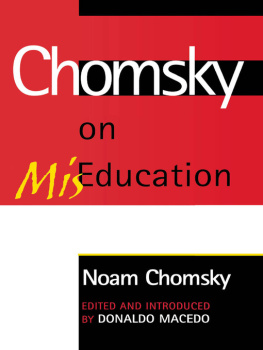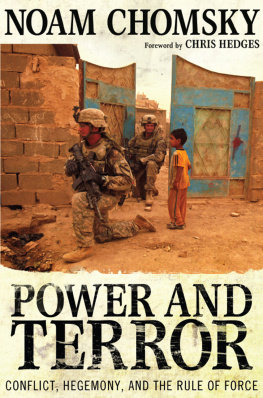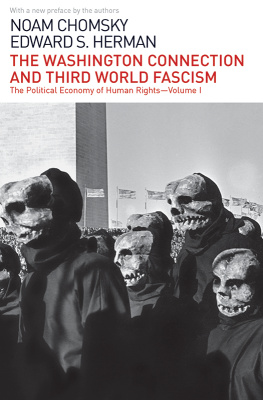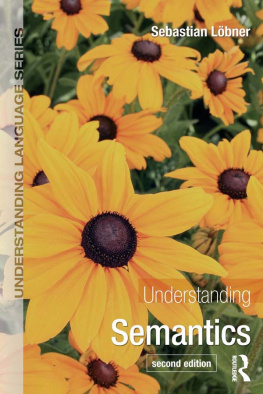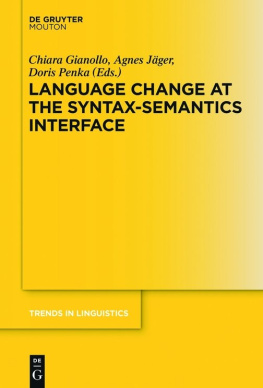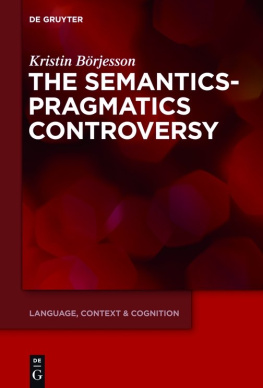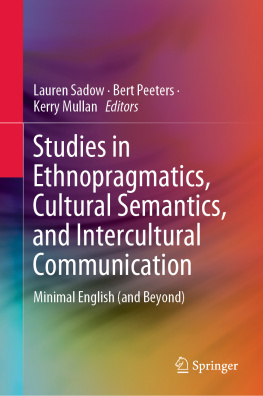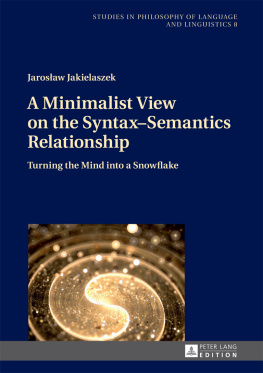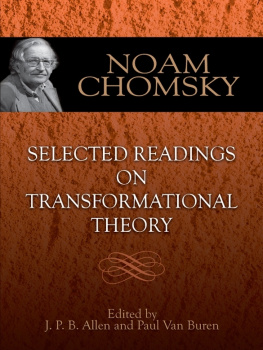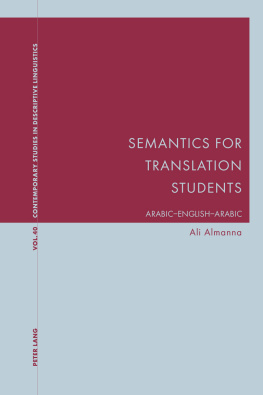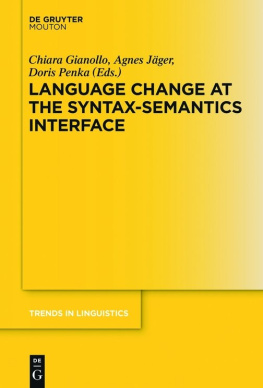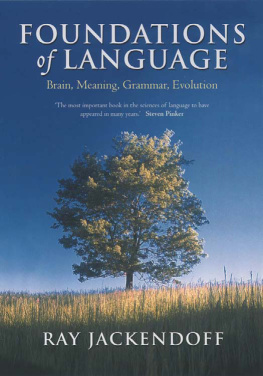Chomsky Noam - The Linguistics Wars
Here you can read online Chomsky Noam - The Linguistics Wars full text of the book (entire story) in english for free. Download pdf and epub, get meaning, cover and reviews about this ebook. City: New York, year: 1995;1993, publisher: Oxford University Press, Incorporated, genre: Home and family. Description of the work, (preface) as well as reviews are available. Best literature library LitArk.com created for fans of good reading and offers a wide selection of genres:
Romance novel
Science fiction
Adventure
Detective
Science
History
Home and family
Prose
Art
Politics
Computer
Non-fiction
Religion
Business
Children
Humor
Choose a favorite category and find really read worthwhile books. Enjoy immersion in the world of imagination, feel the emotions of the characters or learn something new for yourself, make an fascinating discovery.

- Book:The Linguistics Wars
- Author:
- Publisher:Oxford University Press, Incorporated
- Genre:
- Year:1995;1993
- City:New York
- Rating:5 / 5
- Favourites:Add to favourites
- Your mark:
- 100
- 1
- 2
- 3
- 4
- 5
The Linguistics Wars: summary, description and annotation
We offer to read an annotation, description, summary or preface (depends on what the author of the book "The Linguistics Wars" wrote himself). If you haven't found the necessary information about the book — write in the comments, we will try to find it.
The Linguistics Wars — read online for free the complete book (whole text) full work
Below is the text of the book, divided by pages. System saving the place of the last page read, allows you to conveniently read the book "The Linguistics Wars" online for free, without having to search again every time where you left off. Put a bookmark, and you can go to the page where you finished reading at any time.
Font size:
Interval:
Bookmark:
THE LINGUISTICS WARS
RANDY ALLEN HARRIS

Oxford University Press
Oxford New York
Athens Auckland Bangkok Bombay
Calcutta Cape Town Dar es Salaam Delhi
Florence Hong Kong Istanbul Karachi
Kuala Lumpur Madras Madrid Melbourne
Mexico City Nairobi Paris Singapore
Taipei Tokyo Toronto
and associated companies in
Berlin Ibadan
Copyright 1993 by Randy Allen Harris
First published in 1993 by Oxford University Press, Inc.
198 Madison Avenue, New York, New York 100164314
First issued as an Oxford University Press paperback, 1995.
Oxford is a registered trademark of Oxford University Press, Inc.
All rights reserved. No part of this publication may be reproduced,
stored in a retrieval system, or transmitted, in any form or by any means,
electronic, mechanical, photocopying, recording or otherwise,
without the prior permission of Oxford University Press.
Library of Congress Cataloging-in-Publication Data
Harris, Randy Allen.
The linguistics wars / Randy Allen Harris.
p. cm. Includes bibliographical references and index.
ISBN 0-19-507256-1
ISBN 0-19-509834-X PBK.
1. Chomsky, Noam. 2. LinguisticsHistory20th century.
3. Generative grammar. I. Title.
P85.C47H34 1993 410.904dc20 92-34789
Printing (last digit): 4 6 8 10 9 7 5
Printed in the United States of America
For Tom and Dot Harris,
for life, the universe, and everything
There is, most unfortunately, a widespread ignorance and trepidation about linguisticspeculiarly so, since language is unutterably fundamental to our humanhood. Look at this odd comparison Herbert Spencer offered in the nineteenth century (when linguistics was making spectacular advances):
Astonished at the performances of the English plough, the Hindoos paint it, set it up, and worship it; thus turning a tool into an idol. Linguists do the same with language. (1865 [1852]:33)
The comparison, in addition to inventing some mythically idiotic Hindoos, has it exactly backwards. Linguists would take out their wrenches and screwdrivers, pull the plow apart, and try to figure out how it works. The ignorant worship and fear. Scientists worship and investigate. But the attitude Spencer displayssomething we might call linguiphobia if that term didnt conjure up a fear of certain sexual practices or pasta cutshas not abated. Continuing to pick on the British, we can cite one Auberon Waugh, who finds contemporary linguists to be so evil as to play into the hands of Neanderthal conservatives:
Linguistics [has been] reduced by Chomsky and his disciples to a positively mind-boggling level of stupidity and insignificance. If ever [the Prime Minister] wants an excuse to close down a university, she has only to look at its department of linguistics. (1988)
Ignorance is a kind word for Waugh, who is in need of kind words, but his isnt a unique ignorance.
This booka popular science look at linguistics by way of narrating an influential dispute in the sixties and seventiesattempts to clarify what linguists do, why they do it, and why everyone else should care about what they do.
My hope is that linguists will find this book useful, since many of them have a shaky or partisan view of their own recent history, but my greater hope is that nonlinguists will find an entertaining and informative account of the science of our most profound and pervasive human attribute, language.
The bibliographical references in the text are quite standard. Citations are given by author, year of publication, and page numberusually in the main textwith the Works Cited accordingly organized primarily by author and year of publication. (A lowercase letter is suffixed to the year of publication, in the text and the Works Cited, when there is more than one bibliographical entry in the same year by the same author.) But there are two wrinkles.
First, there was a great deal of underground literature circulating during the period of interest, only some of which eventually surfaced, so that time-of-composition is often more important than time-of-publication, and I have tried to provide a bit of a road map here by including year-of-composition, in brackets, after year-of-publication. For instance, George Lakoffs claim that a generative semantic theory may well be simpler and more economical than an interpretive theory shows up as Lakoff (1976a [1963]:50). Consistency called for me to maintain this style for most other authors as well, leading at times to some awkward looking citations like James (1981 [1907]), for his Pragmatism lectures. The only authors for whom I have avoided this style are the ancientspreferring the conventional Aristotle (Rhetoric 1358b) to the ugly and overly specific Aristotle (1954 [c355 B.C.]:32).
Second, the research for this book blurred at times into an oral-history project, generating hundreds of pages of interview transcripts, hundreds of pages more of letters and e-mail printouts, and almost as many pages of telephone bills. When quoting from this materialwhich I do quite extensively in the later chaptersthere is no citation at all. An embedded quotation, then, like In Rosss terms, Lakoff is fearless, absolutely fearless, without further attribution, is by default a remark made directly to me by Ross.
I would like, very gratefully, to acknowledge the contributions and assistance of a great many people to this book.
First, I thank the many scholars who responded to my letters, e-mail, phone calls, and hallway ambushes with (mostly) good will, candor, and generosity: Dwight Bolinger, Guy Carden, Wallace Chafe, Bruce Derwing, Matthew Dryer, Joseph Emonds, Charles Fillmore, Susan Fischer, Bruce Fraser, Gerald Gazdar, Allan Gleason, John Goldsmith, Joseph Greenberg, Geoffrey Huck, Robert Kirsner, E. F. Konrad Koerner, Yuki Kuroda, Robin Lakoff, Judith Levi, George Miller, Stephen Murray, Greg Myers, Margaret Nizhnikov, Gary Prideaux, Geoffrey Pullum, Wallace Reid, Sally Rice, Sarah Grey Thomason, Don Walker, and Anna Wierzbicka.
Second, and with even more gratitude, I thank the scholars who set aside valuable time to speak with me at length, also with (mostly) good will, candor, and generosity: Thomas Bever, Noam Chomsky, Jerry Fodor, Morris Halle, Ray Jackendoff, Jerrold Katz, Jay Keyser, Susumu Kuno, George Lakoff, Howard Lasnik, Robert Lees, James McCawley, Frederick Newmeyer, Paul Postal, Hj Ross, Jerrold Sadock, and Arnold Zwicky.
Bolinger, Chafe, Chomsky, Gleason, Jackendoff, Lakoff, Lasnik, McCawley, Murray, Myers, Newmeyer, Postal, Prideaux, and Ross deserve still more gratitude, for reading and commenting on various earlier bits and pieces of this book, as do Victoria Bergval, Allen Fitchen, Michael Halloran, Lou Hammer, Pete Matthews, Leo Mos, Terry Nearey, Cynthia Read, Nicolette Saina, and Jim Zappen. Cynthia, my editor, gets another large measure of gratitude for cheerfulness beyond the call of duty. Many thanks also to Susan Hannan, Kim Honeyford, Sylvia Moon, Jean Mulder, and Philip Reynolds.
Not all of these people agree with what this book says, of course, or how it says what it says, and most will happily insist that any flaws are mine alone, but two people disagree so violently with the substance of this book as to require special notice, Chomsky and Lakoff. Both had very extensive comments on the same previous incarnation of the book, comments which I found mostly very profitable, and for which I remain extremely grateful, but both had very strong negative responses to the overall arrangement and orientation. Their responses were essentially inverse, Lakoff finding me to have sided with the interpretive semanticists, Chomsky finding me to have told the generative semantics version, both feeling that I slighted or ignored their own impressions or interpretations of the dispute. I should stress that the version they saw is very different in many ways from the one in your hands, but I have reason to believe that neither of them will be much more pleased with this version (their displeasure, in fact, may very well increase, since some of the latent elements that they found objectionable in the earlier version are stated a little more directly here; my correspondence with them sharpened my judgments on several matters, sometimes in directions neither of them would have preferred). Indeed, Chomsky even objects strenuously to my characterization of him in this preface; he sees no symmetry between his and Lakoffs opposition to the book. I am naturally distressed by their negative reactions, but it would have unquestionably been impossible to satisfy both; perhaps by satisfying neither, I am closer to neutrality than either of them believe.
Next pageFont size:
Interval:
Bookmark:
Similar books «The Linguistics Wars»
Look at similar books to The Linguistics Wars. We have selected literature similar in name and meaning in the hope of providing readers with more options to find new, interesting, not yet read works.
Discussion, reviews of the book The Linguistics Wars and just readers' own opinions. Leave your comments, write what you think about the work, its meaning or the main characters. Specify what exactly you liked and what you didn't like, and why you think so.


